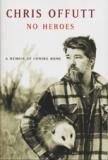Nothing More Than a Feeling
In his 40th year, Chris Offutt took his wife and two sons home to the hills of eastern Kentucky so he could teach creative writing at Morehead State University, his alma mater, which, he confesses, was more of a high school with ashtrays than a genuine college. Even the location was not much, just an Appalachian town of six thousand with no airport, no bookstore, no deli, no record store, one bar, and forty churches. And yet for most of the 20 years that Offutt had been away, he’d been dreaming of coming back, feeling that a part of me had died the day I left the hills. I was like an amputee feeling perpetual pain in my phantom limb.
Reacquainting himself with Rowan County, Offutt visits the elderly first- grade teacher who taught him to read, the librarian who let the boy check out as many as 20 books a week, the maintenance crew that he’d painted curbs with as an undergraduate, a successful real estate saleswoman whom he knew in college and who still got plumb wald at weekend parties, hillbilly friends who have become hard luck ne’er-do-wells. Each watches him cautiously: They want to see the changes that the outside world put on you. They are curious to know if you’ve lost your laughter. They are worried that perhaps you’ve gotten above your raisings.
Interleafed with Offutt’s story is that of his in-laws, Arthur and Irene, Polish Jews who were put in separate concentration camps during World War II but who miraculously survived the Nazi brutalities, found each other again in Kraków in 1946 and soon emigrated to New York, where Arthur landed a job with an architectural firm whose offices were in the World Trade Center.
Offutt records their memories of the Holocaust in the hope that their stories will somehow connect with the journal entries he’s writing about his efforts to give back something to his Kentucky community. At first I thought the notion of home would bind the narrativesmy constant desire to return, his utter commitment to never go back.
The heartbreak of his memoir is that Offutt finally comes to Arthur’s conclusion that home is a feeling, nothing more. Home is illusory, like love, then it disappears. Once you leave, you become a stranger. Offutt’s success elsewhere has made him just that, and he finds he no longer fits in. In college he had worn a jacket button that proclaimed his late-70’s political stance: No Heroes. And yet he had tried to become one. My goal was to teach writing in a region where thirty percent of the people were functionally illiterate, where a struggling student admits she’d never been in a bookstore, where a friend presumes it takes about a month to write a book because [t]hat’s when they change the paperbacks at Wal-Mart.
The fact is, I’d essentially failed as a teacher. Most of my work was remedial, even on the graduate level, and I didn’t know how to give my students what they required. My chief difficulty was accepting that my students needed to be educated in how to be educated, and I simply wasn’t up to the chore. And so, feeling as he always had in Rowan Countyutterly trapped, desiring escape, Offutt accepts a visiting position at the University of Iowa Writers’ Workshop, resigns from his job at Morehead, sells his house and hands over the title to his red 1968 Malibu to a stunned friend, who spends a whole day sitting on a lawn chair just grinning at the car.
Chris Offutt is the author of an earlier, highly regarded memoir, The Same River Twice, of a novel, The Good Brother, and of the critically acclaimed story collections Kentucky Straight and Out of the Woods. In other hands No Heroes might have been a dreary tale of a do-gooder gone wrong, but Offutt is such a fine raconteur and so full of self-effacing charm, humor and intelligent observation that his memoir is a joy to read and may, as they say in the hills, just break your little heart.
This article also appeared in print, under the headline “Nothing More Than a Feeling,” in the July 1, 2002, issue.








